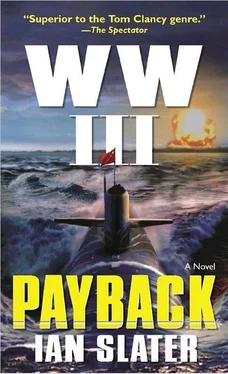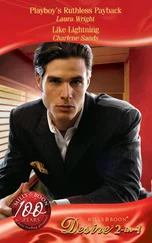“Why not?” said Lesand, seizing the CNO’s inspired APM — ass-protecting maneuver — of letting Freeman take all the risk. “Douglas is always champing at the bit, a warrior born and bred. But where do we get the team? No one in his right mind—”
“Douglas,” said the CNO, his use of Freeman’s first name contributing to the apparent reasonableness of the proposal, “has his own SpecOp team.”
“In service?” pressed Lesand.
“No. Ex-service Special Forces guys.” Which was as pleasant a way as any of pointing out, without actually saying it, that if nonservicemen with no ID, using off-shelf weapons of choice, the weapons’ MID numbers removed — not by some half-assed-qualified ex-armorer behind a pawnshop cage but laser-removed by the agency — were caught, it could be officially “deniable” that these were U.S. troops, but rather that they were renegade former soldiers, like the patriotic readers of magazines such as Soldier of Fortune , which had once offered $50,000 to anyone who could get a piece of the Communists’ celebrated 600-pound red, white, and blue North Korean flag that flew over the heavily NKA-patrolled sector of the DMZ. The flag, standing over 500 feet high, was the tallest in the world and was situated in Kijong-dong, a so-called North Korean village in the 148-mile-long, 21/2-mile-wide demilitarized zone. The village was in fact completely deserted, nothing more than a “Ptompkin Village”—Hollywood-like facades built to create the impression of order and prosperity, its flag a continuous challenge to soldiers of fortune.
In short, the Chief of Naval Operations, Lesand of the Air Force, Army General Kruger, and the Marines’ Taft were agreed that unlike “Operation Rice Bowl,” or “Desert One Slaughter,” as the media and public had understandably dubbed it, this payback operation against North Korea could not be officially sanctioned or made up from any “active list” of Army, Air Force, Marine, or Navy personnel. And they agreed that the public pressure for the President to do something should mean the President would go for the idea of a strike in a month, rather than two to three months. If Douglas Freeman and Co. succeeded, the payback op would be an unambiguous message to the North Koreans that, their 832 nuclear-warhead-capable rockets notwithstanding, the United States would in no way cower before terrorists, as Chamberlain had against Hitler and the Nazi terror.
On the other hand, if the attack failed, U.S. policy would be to officially deny any involvement, the President already having made the shrewd observation to Eleanor and the Joint Chiefs that in the press of world opinion, those who were vehemently hostile to America were going to think the worst of the United States whatever happened. And if North Korea, God forbid, captured any of the SpecFor team and paraded them before international media crews, there would be nothing to prove an officially sanctioned raid.
The generals conceded it would be a weak denial — but well within the modus operandi of the diplomats in Foggy Bottom — and official records would show Douglas Freeman’s team were not on the active list.
“Yes,” said the President upon his return from the press conference ahead of Eleanor, who was still answering questions, “I think Douglas would be the ideal man, though I’m not sure I want him to physically be involved in the attack. After all, he is officially retired.”
When Eleanor returned from the press conference, where she had reiterated the possibility of there being a plethora of MANPAD bases in other hostile countries, in order to draw attention away from North Korea, she was taken aback by the Joint Chiefs’ mercurial turnaround. Having at first resented the National Security Advisor’s seeking the ex-legend’s advice, they now actively sought his involvement in a SpecOps attack. She was angry. Had the “boys,” as she called them whenever she sensed a “gang-up,” really thought that Eleanor Prenty — even if she hadn’t gained her Ph.D. in political science and international relations or attended the postgrad intellectual marathon “War and Society” course that they and Freeman had — wouldn’t be able to see through their ass-saving plan? If the raid against the launcher warehouse near the port of Kosong, which lay at the foot of the wild and rugged Taebek Mountain range worked, the chiefs would claim much of the glory. If it didn’t succeed, they’d disown it — in keeping with the traditional military axiom that victory has a hundred parents, while defeat is an orphan.
“General Freeman’ll see what you’re up to in a flash,” she chastised them, trying to contain her disgust, though she recognized that in the hard world of realpolitik, the generals did have a point in that the U.S. could simply disown Freeman and his team if he failed, disavowing any official U.S. involvement.
“You think he’s the only one who’s been asked to go in sans ID to serve his country?” the Marine commandant chided her.
“No,” she admitted. “I don’t.” She’d seen the commandant’s service record. He’d done such unofficial missions — like the SEALS who, disembarking from U.S. subs in what was clearly the sovereign North Vietnamese coast zone, had swum up from the littoral sea into the rat-infested sewers of Hanoi and planted what were still referred to in “Eyes Only” files as “devices.”
“What d’you think?” the President cut in as he watched the networks broadcasting his news conference. “Think I convinced them North Korea isn’t our target?”
“I think so,” said Eleanor, trying to cool down. “I saw Steve Loren of the Times adding the usual suspects to the list — al Qaeda, Libya, et cetera.”
“You can read upside down from twelve feet away?” the CNO asked her lightheartedly.
She smiled. Not even the Joint Chiefs knew about the pinhead-sized overhead cam that took in the reporters’ notes from behind the press gallery. A sign of the times.
Douglas and Margaret lay satiated once more, but something had changed in him, his lust now expended in the petit mort, the little death, that so often followed the physiological climax. The momentary emptiness, for some, the search — the yearning — for meaning, however brief, that at times attaches itself to sexual exhaustion, visited him, and he held Margaret closely. For a moment she became Catherine, the woman he’d loved, and who, like so many military wives, had sustained him through the vicissitudes, the multitudinous trials, of service life so alien to the public they protected.
A pang of guilt assaulted him. Was he using Margaret as a surrogate Catherine? Or was he merely indulging in that near-obsessional compulsion he had to overanalyze, a disposition that had been at the heart of his success as a career soldier? He stroked her hair, an attempt to repay her sincerity, her obvious love for him, in kind. For the first time in a long while, General Douglas Freeman, retired, was confused. War, for all its myriad details, was a simpler thing all round than love. What he needed, he told himself, was clarity, to get back into the war, for he believed that ultimately it was what a man did outside of bed — his job —that defined who he was. For Douglas Freeman and his ilk, the politically incorrect, honest-to-God truth was that peace is hell.
But at least now, he mused, he had contributed something in a military sense to the White House’s understanding of the weaponry unleashed in this latest terrorist blitz of the war. He was also harboring the conceit that despite his retirement status, his body belied his age. His abs didn’t have the hard, washboard look of the 24-7 gym fanatics, but rather exhibited the solid no-flab toughness of a Special Forces warrior ten years younger, despite the occasional “guerrilla” attack, as he described an occasional weakness in his left knee, brought on by the kind of subzero cold he’d experienced during his command of the U.S.-led U.N. force. But the knee had never bothered him with his occasional sexual liaisons with CNN’s Marte Price, or now with Margaret.
Читать дальше












